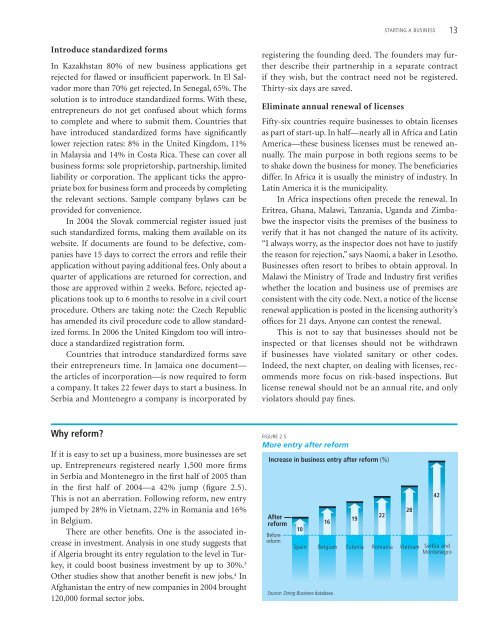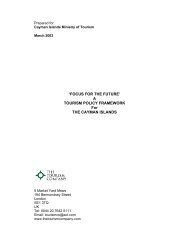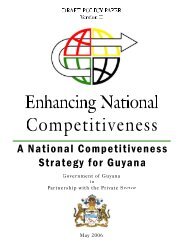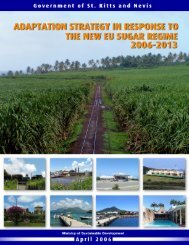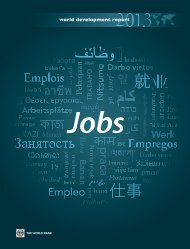Creating
Doing Business in 2006 -- Creating Jobs - Caribbean Elections
Doing Business in 2006 -- Creating Jobs - Caribbean Elections
You also want an ePaper? Increase the reach of your titles
YUMPU automatically turns print PDFs into web optimized ePapers that Google loves.
STARTING A BUSINESS 13<br />
Introduce standardized forms<br />
In Kazakhstan 80% of new business applications get<br />
rejected for flawed or insufficient paperwork. In El Salvador<br />
more than 70% get rejected. In Senegal, 65%. The<br />
solution is to introduce standardized forms. With these,<br />
entrepreneurs do not get confused about which forms<br />
to complete and where to submit them. Countries that<br />
have introduced standardized forms have significantly<br />
lower rejection rates: 8% in the United Kingdom, 11%<br />
in Malaysia and 14% in Costa Rica. These can cover all<br />
business forms: sole proprietorship, partnership, limited<br />
liability or corporation. The applicant ticks the appropriate<br />
box for business form and proceeds by completing<br />
the relevant sections. Sample company bylaws can be<br />
provided for convenience.<br />
In 2004 the Slovak commercial register issued just<br />
such standardized forms, making them available on its<br />
website. If documents are found to be defective, companies<br />
have 15 days to correct the errors and refile their<br />
application without paying additional fees. Only about a<br />
quarter of applications are returned for correction, and<br />
those are approved within 2 weeks. Before, rejected applications<br />
took up to 6 months to resolve in a civil court<br />
procedure. Others are taking note: the Czech Republic<br />
has amended its civil procedure code to allow standardized<br />
forms. In 2006 the United Kingdom too will introduce<br />
a standardized registration form.<br />
Countries that introduce standardized forms save<br />
their entrepreneurs time. In Jamaica one document—<br />
the articles of incorporation—is now required to form<br />
a company. It takes 22 fewer days to start a business. In<br />
Serbia and Montenegro a company is incorporated by<br />
registering the founding deed. The founders may further<br />
describe their partnership in a separate contract<br />
if they wish, but the contract need not be registered.<br />
Thirty-six days are saved.<br />
Eliminate annual renewal of licenses<br />
Fifty-six countries require businesses to obtain licenses<br />
as part of start-up. In half—nearly all in Africa and Latin<br />
America—these business licenses must be renewed annually.<br />
The main purpose in both regions seems to be<br />
to shake down the business for money. The beneficiaries<br />
differ. In Africa it is usually the ministry of industry. In<br />
Latin America it is the municipality.<br />
In Africa inspections often precede the renewal. In<br />
Eritrea, Ghana, Malawi, Tanzania, Uganda and Zimbabwe<br />
the inspector visits the premises of the business to<br />
verify that it has not changed the nature of its activity.<br />
“I always worry, as the inspector does not have to justify<br />
the reason for rejection,” says Naomi, a baker in Lesotho.<br />
Businesses often resort to bribes to obtain approval. In<br />
Malawi the Ministry of Trade and Industry first verifies<br />
whether the location and business use of premises are<br />
consistent with the city code. Next, a notice of the license<br />
renewal application is posted in the licensing authority’s<br />
offices for 21 days. Anyone can contest the renewal.<br />
This is not to say that businesses should not be<br />
inspected or that licenses should not be withdrawn<br />
if businesses have violated sanitary or other codes.<br />
Indeed, the next chapter, on dealing with licenses, recommends<br />
more focus on risk-based inspections. But<br />
license renewal should not be an annual rite, and only<br />
violators should pay fines.<br />
Why reform?<br />
If it is easy to set up a business, more businesses are set<br />
up. Entrepreneurs registered nearly 1,500 more firms<br />
in Serbia and Montenegro in the first half of 2005 than<br />
in the first half of 2004—a 42% jump (figure 2.5).<br />
This is not an aberration. Following reform, new entry<br />
jumped by 28% in Vietnam, 22% in Romania and 16%<br />
in Belgium.<br />
There are other benefits. One is the associated increase<br />
in investment. Analysis in one study suggests that<br />
if Algeria brought its entry regulation to the level in Turkey,<br />
it could boost business investment by up to 30%. 3<br />
Other studies show that another benefit is new jobs. 4 In<br />
Afghanistan the entry of new companies in 2004 brought<br />
120,000 formal sector jobs.


